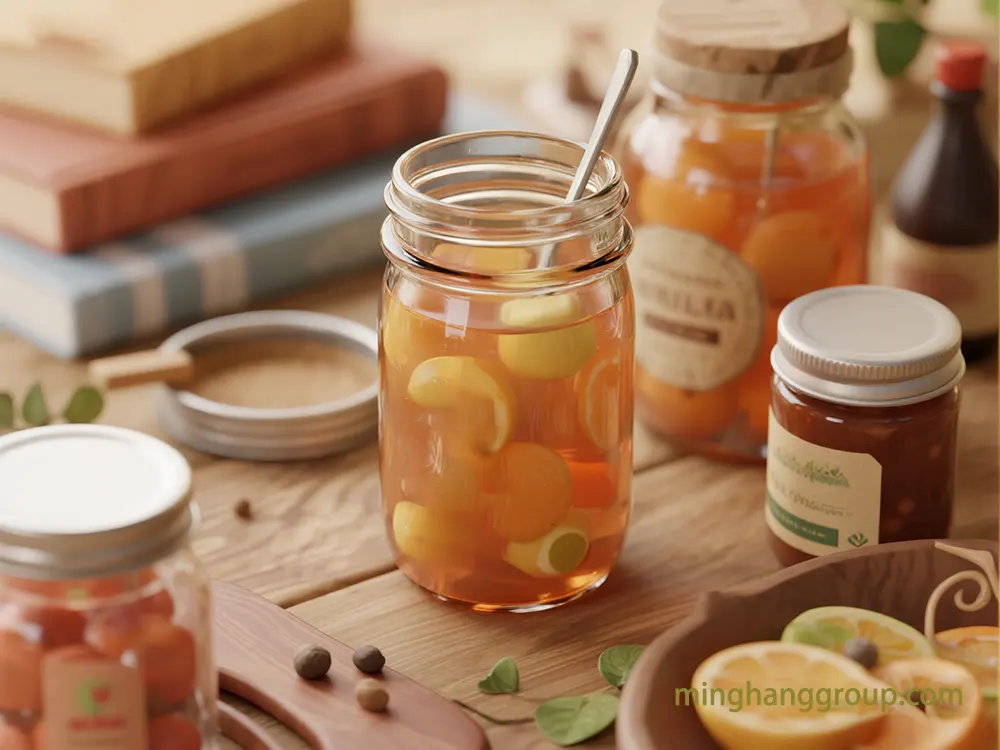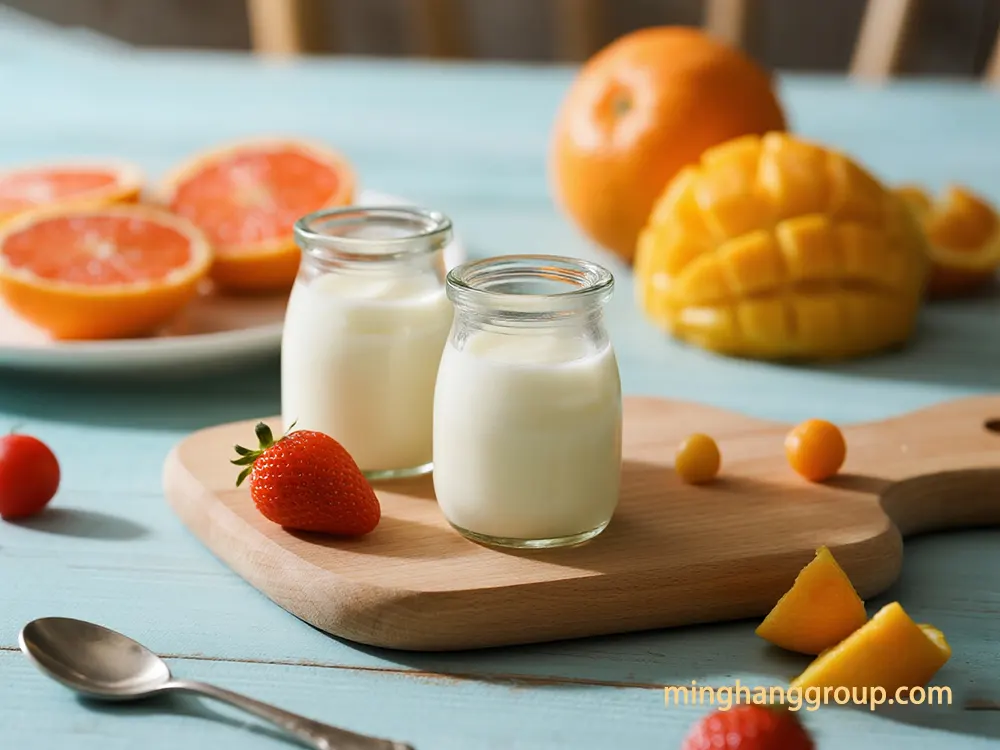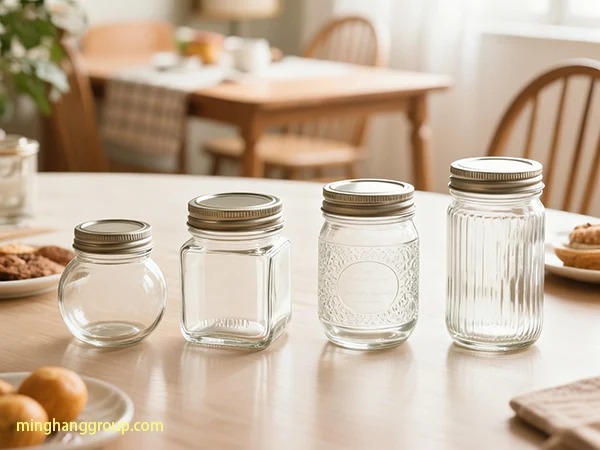Introduction
Worldwide oil bottles wholesale sector is ready for a massive change in 2026, mainly due to consumer demand increase, sustainability requirements, and packaging innovations. Minghanggroup, being a major oil bottles wholesale provider, has a wide range of glass oil bottles, as well as a number of options for custom solutions that are durable, attractive, and made of eco-friendly materials. The most significant markets for growth are the Asia-Pacific region and other emerging economies which are impelled by higher disposable incomes and changing patterns of consumption. The main aspects of sustainability commitment that are strongly featured in the manufacturing of oil bottles wholesale are recycled content, bio-based polymers, and lightweighting. Even though supply chain resilience has been a challenge because of recent disruptions, it is still a very important factor and thus, Minghanggroup’s planned logistics and diversified sourcing options give a competitive advantage to distributors and brand owners, who can benefit from them equally.
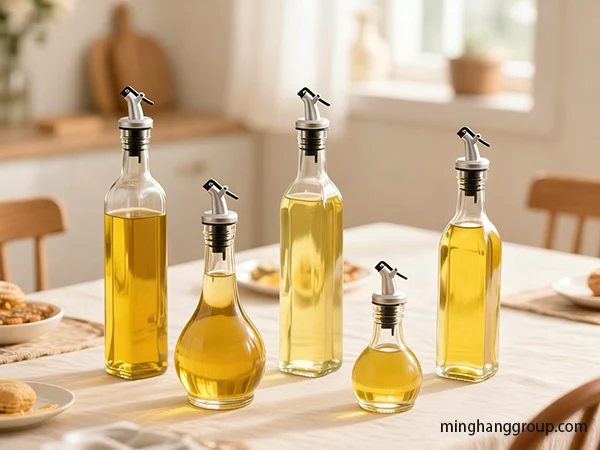
Introduction & Research Scope
The oil bottles wholesale market is dedicated to the bulk distribution of packaging for edible oils, essential oils, automotive oils, and industrial oils. This report is about worldwide trends, regional expansions, and distributor-oriented strategic possibilities.
Oil Type Segmentation
- Edible Oils: Common oil like olive oil, sunflower oil, canola oil and special oils like avocado and sesame.
- Essential Oils: Used in the industries of aromatherapy, cosmetics, and fragrance, thus, requiring oil bottles made of UV-protected glass.
- Automotive & Industrial Oils: These are lubricants, engine oils and hydraulic fluids that require a packaging that is strong and resistant to chemicals.
Geographic Focus
Emphasis of the report is on North America, Europe, Asia-Pacific, Latin America, and Africa and it involves analysis of the regulatory influences, demand patterns, and growth potential in these regions. Minghanggroup’s oil bottles wholesale activities are tailored to reach these markets, offering the best combinations of glass bottles, PET, and HDPE to fulfill both premium and volume requirements.
2026 Global & Regional Market Overview: Oil Bottles Wholesale
The worldwide oil bottles wholesale market is expected to maintain its upward trend of 2026, with a strong compound annual growth rate being the outcome of various phenomena such as changes in the human population structure, industrial growth, and shifting consumer preferences. Minghanggroup, as a source of supply, fulfills a very important role by providing stable oil bottles wholesale solutions for glass oil bottles that cater to the increasing demand for both edible and essential oils.
Market Drivers
- Growing population and increasing urbanization that collectively contribute to a higher demand for packaged oils.
- Increase in disposable incomes, majorly in developing countries.
- The rise of e-commerce business that requires packaging to be more durable and less bulky.
- The health and wellness trends that facilitate the market for premium and specialty oils.
- The industrial growth that escalates the requirement for the packaging of the automotive and industrial oils.
Market Segmentation
By Oil Type
- Edible oils are the biggest sellers by volume, and therefore there is a necessity for affordable glass bottles, as well as conveniently-sized packaging.
- Essential oil samples are packed in a premium glass oil bottle, most probably in amber or cobalt color, with a precision dropper for the most accurate dispensing of the product.
- Automotive and industrial oils pack their products in HDPE or PET to achieve chemical resistance and long-lastingness of the containers.
By Bottle Material
- Glass: The most desirable material for premium edible and essential oil products; it is recyclable as well as being attractive.
- PET: A solution for lightweight and shatter-proof needs; rPET is a sustainability-friendly version of PET.
- HDPE: Strong, opaque, and chemically resistant, this plastic is mainly used for industrial applications.
- Aluminum: Increasing use for high-value oils; it brings a luxurious look to the product, and also offers finite recyclability.
By Closure Type
Examples of closure types span across: screw caps, dispensing caps, droppers, roll-ons, and child-resistant closures.
Regional Dynamics
- Asia-Pacific: The region is the major driver of global growth, it has very lively demand sources for edible and essential oils.
- North America & Europe: The markets in these regions are well-developed and highly competitive, and sustainably packaging is effectively being brought to everyday usage through their collaboration.
- Latin America & Africa: In these areas, cost-effective and well-packaged products have been the major factors that influenced the market; however, the sustainable aspects of these products are gaining popularity as well.
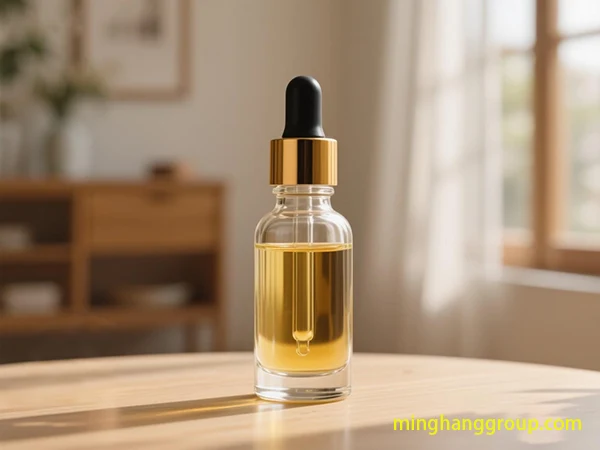
Value Chain Dynamics: From Manufacturers to End-Users
The offshore oil bottles wholesale ecosystem mainly includes the upstream bottle manufacturers, wholesale distributors, and industries that use these products.
Bottle Manufacturers
- Selecting Raw Materials: recycled glass, PET, HDPE, aluminum.
- Factory Processes: blow molding, injection molding, glass forming, and robot usage.
- Producing Reliable Products: meeting regulations and requirements for food-grade products.
- Intervention: unlimited branding possibilities and one-of-a-kind ideas.
Wholesale Distributors
- Expertise in stock and logistics management.
- Value-adding activities: labeling, kitting, re-packaging.
- Market intelligence: by knowing market demands, they make it more convenient for manufacturers to adapt and offer more attractive oil bottles wholesale products.
End-User Industries
- Food & Beverage: Safety, transparency, freshness.
- Beauty & Personal Care: Elegant glass oil bottles with accurate dispensers.
- Automotive & Chemical: strong, packaging that is resistant to chemicals.
Profit Pools & Leverage Points
- Manufacturers and wholesalers are brought closer with the help of collaborative forecasting and long-term contracts.
- Wholesaler-end-user relationships can be most effectively utilized through just-in-time delivery, tailoring, and technical support.
Material Innovation & Design Trends
Oil bottles wholesale is leading the pack in the transition to environmentally friendly packaging, which takes into consideration the usefulness of the product together with the use of earth-friendly material.
Sustainable Materials Revolution
PET, HDPE, biopolymers (PLA, PHA), lightweighting, aluminum and closed-loop systems. Other than oil bottles wholesale distributors, the utilization of recycling and bio-based materials in implementation are slowly gaining significance to the Minghanggroup clients.
Smart Packaging Features
The usage of QR codes, the use of NFC tags, the use of temperature sensors, and the use of the tamper-evident features are one of the primary features that contribute to traceability (consumer trust).
Design Aesthetics and functionality
The key trends of the development of oil bottles design wholesale are ergonomic forms, premiumization, minimalistic design, enhanced dispensing mechanism, and child-proof lids.
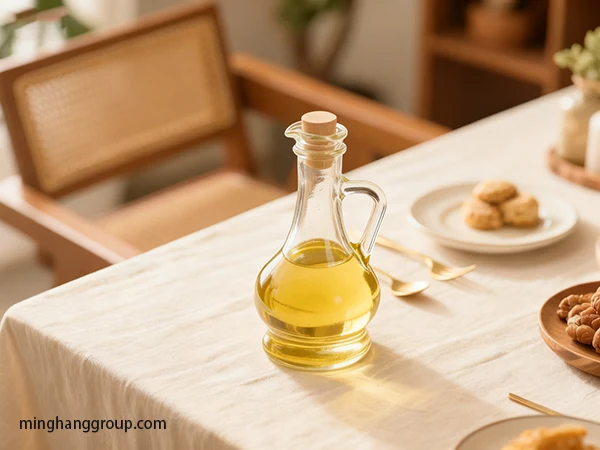
Sustainability & Regulatory Environment
The oil bottles wholesale market is a market with a downward trend, as because of the sustainability requirements, the increased environmental control and the shift in the consumer tastes and preferences.
- Extended Producer Responsibility (EPR): Producers have to take the full lifecycle of the product including recyclable contents and costs on EPR.
- Plastic Taxes and Material Bans: RPET, rHDPE and alternative materials are gradually gaining usage in the industry.
- Consumer Demand: Environmentally aware consumers will choose a sustainable, transparent, refillable, or reusable packaging.
- Certifications & LCA: Are a guarantee of sustainability of the claims made and are used to give guidance on how to choose the materials/processes.
The wholesale businesses must pioneer in their activities in case they desire to be in a position to sustain their competitive status.
Supply Chain Resilience and Pricing
In 2026, the supply chain resilience and flexible price of oil bottles will be very crucial in the wholesale business of oil bottles.
- Resilience Strategies: Inventory: Increased number of suppliers, Regionalized/nearshore production, Buffer stocks, AI analytics.
- Issues: Volatility of freight, port congestion, final mile delivery, fluctuation in the cost of raw materials.
- Pricing: value-based pricing, cost-plus pricing, competitor-based, MOQs and customization that affect unit cost.
With a powerful supply chain and a pricing strategy of flexibility, the business will be profitable and trustworthy.
Strategy Positioning and Competitive Analysis
The oil bottles wholesale market is one of the competitions between the world leaders, domestic experts, and dynamic new participants.
- Large Competitors: O-I, Ardagh, Berry Global, Amcor.
- Movements: cost-leadership, differentiation, market segmentation, sustainability leadership, technological edge.
- Minghanggroup: Provides the full-range glass bottles, custom designs, environmentally friendly materials (rPET, rHDPE, bio-polymers), supply chain benefits, ISO/FDA certification, reasonable prices.
Opportunities and Risk Assessment of 2026
It is the oil bottles wholesale market where one will find the combination of a chance of growing significantly and the risks that are likely to be encountered that should be managed prudently.
Strategic Opportunities
- Green Packaging: The growing interest in environmentally friendly solutions is the key reason why investments are made into rPET, bio-based polymers, and lightweight technologies.
- New Markets: Asia-Pacific, Latin America, and Africa regions are beckoning the companies that are interested in expanding them either through local partnership or direct entry.
- E-commerce Improvement: This will be through adoption of packaging that is lightweight, durable and presentable to facilitate increase of online retail.
- Smart Packaging: It becomes easier to trace the product, authenticate it and verify its integrity through the use of QR codes, NFC tags, and sensors.
- Supply Chain Partnerships: Collaboration with suppliers, logistics, and tech providers provides the business with a clearer understanding of the business, greater efficiency, and saves on costs.
- Customization & Niche Markets: The flexibility of the solutions provided to specialty oils and the existence of the artisanal brands will allow the company to understand the high value segments.
Key Risks
- Raw Material Volatility: The fluctuating margins are caused by UnsTable prices of resins, glass and energy.
- Regulatory Pressure: The environmental laws, plastic taxes, and ban of materials by the company, will always have to be strictly observed.
- Supply Chain Uncertainties: Geopolitical factors, calamities, and logistical challenges could lead to delays in the delivery.
- Alternative Packing Competition: Pouches, bag-in-box packaging styles can pose a threat to the traditional bottles.
- Economic Slowdown: the restricted consumer spending will be the primary impact on the demand of premium oils.
- Technological Obsolescence: There will be a loss of competition in the case of non-innovative approaches.
Mitigation Strategies
- Diversification: It is better not to put all your eggs into one basket, be it the suppliers, location or customers.
- Hedging & R&D: In addition to price volatility, this is also establishing the trend on sustainable materials and intelligent packaging.
- Agile Supply Chains: Creation of such chains that are agile and adaptable to interference.
- Stakeholder Engagement: Operate in conjunction with regulators, associations and clients so that one is ahead of the curve.
A wholesale business that makes use of a strategic approach using an oil bottle will manage to remain competitive, sustainable and resilient in a volatile and changing market.
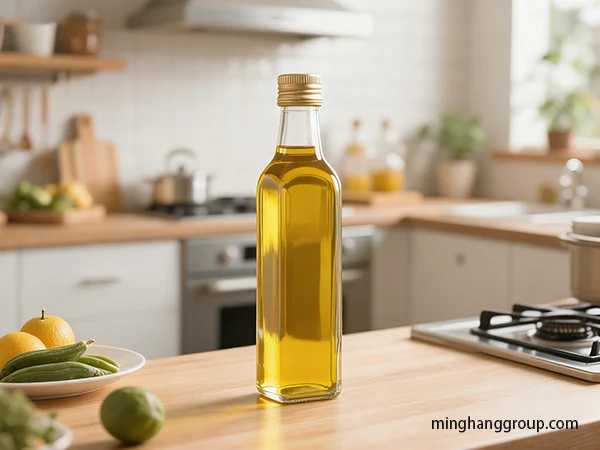
Conclusion & Future Outlook
Leading concerns of oil bottles wholesale in 2026: sustainability, innovation, supply chain resilience. To name a few: circular economy, smart/biodegradable materials, AI-powered personalization and logistics, regulatory alignment are some of the trends. The next generation that cares deeply about the planet and the environment, such as Minghanggroup, will be the ones to lead the global packaging eco-system towards being responsible, efficient, and competitive.


